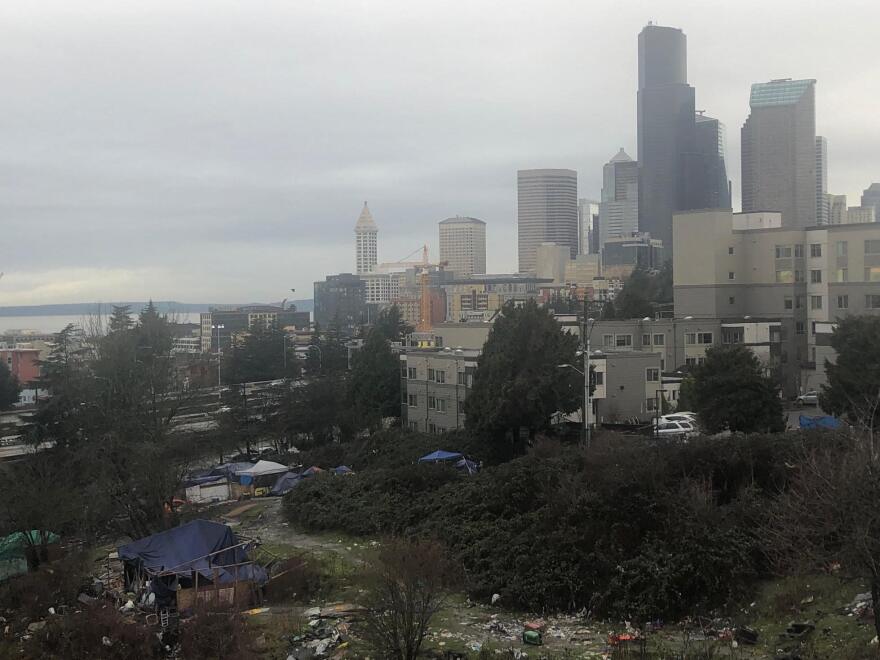Do illegal homeless camps generate crime? It's a sensitive question, but one that's becoming politically urgent in cities where pandemic-era tolerance policies have allowed the camps to sprawl into more visible areas.
In Los Angeles, Sheriff Alex Villanueva has been at loggerheads with city leaders, accusing them of being too lax with camps. In San Francisco, Mayor London Breed recently promised to crack down on the illegal drug economy in the Tenderloin district, where sidewalk camping is common.
And in Seattle, there's concern about people going into the camps on their own to try to retrieve stolen goods — last summer, one such incident led to a death.
But experts warn against jumping to conclusions.
"It's very difficult to say that the encampments themselves are what's creating the crime," says Alexis Piquero, a sociologist at the University of Miami who studies policing and homelessness. He points out that camps often go up in marginal parts of town, or near crime-prone locations such as pawn shops or liquor stores.
"What that means is that the area around those encampments is already criminogenic — it has the ingredients, if you will," Piquero says.
That makes it hard to figure out how much crime would be happening in a city anyway. It's also hard to get an accurate count of unsanctioned camps, which move around and can be hard to find.
The methodological problems were so daunting, quantitative sociologist Charles Lanfear at the University of Oxford had shelved his research into it — until he discovered a meticulous census of camps done at different points in time by a professor and her students at Seattle Pacific University.
"I basically immediately began screaming in my head," Lanfear recalls. "It's the only sort of data set of this kind that I've ever seen — in a place where you also have reasonably good data on crime."

Increases in the size of homeless camps are not associated with increases in property crime, on average
The data allowed him to build a statistical model analyzing the change in reported property crimes in relation to the growth of the camps.
"On average, an increase in the number of tents and structures in an area is not associated with any increases in property crime — very close to zero," Lanfear says.
He's still finalizing his project, which has yet to be published, and he admits people may have trouble accepting his conclusion.
"There is such a strong association between encampments and crime, that it's leading people to assume that any change in property crime is attributable to the tents and structures in their neighborhood," Lanfear says.
He also stresses this is a city-wide average. The culture of homeless camps varies a lot, and he says it's possible some camps are benign, while others generate more than their share of crime.
In Seattle, people point to camps downtown, where the open sale and consumption of drugs such as meth has become a broad-daylight routine. Sidewalk tents have been found containing stashes of goods stolen from nearby stores; drug users peddle stolen liquor to passers-by.

"This in many ways is a cancer on our downtown retail environments," says Downtown Seattle Association President Jon Scholes. "The illegal retail trade feeds and sustains an illegal, active drug market."
Police confirm the reports of crime in unsanctioned camps
Police officers tend to share this analysis. The Seattle Police Department has been instructed to take a more hands-off approach to the camps in recent years, and it wouldn't make any officers available to NPR for an interview. But in private, officers express frustration.
Carol Cummings is a recently-retired suburban police chief who's lived in Seattle for decades, and who regularly talks to SPD patrol officers about what they're seeing. They confirm the reports of stolen merchandise in unsanctioned camps, but she says they're especially unhappy about the frequency of crimes committed inside the camps.
"It's hard, because they know that there are people within those encampments that are victims themselves, that they're not able to reach out to and help," she says. "I know that might surprise people that an officer might think that, but in fact that is the truth."
Cummings is surprised by Lanfear's analysis showing no property crime increase, on average, associated with growing camps. She wonders whether that might be because people have become less likely to report the crimes. She says in her neighborhood — which has seen rapid growth in homeless camping — many people seem to have given up on calling the police.
People are "losing faith that they can expect justice"
"I am getting progressively more concerned about some of the conversations that I'm hearing in my community," she says. "They're losing faith that they can expect justice. And when that happens, it then defaults to the individual to protect themselves and their families. And that's where I get concerned."
Meanwhile, leaders of liberal cities such as Los Angeles and Seattle continue a to try a more tolerant policy toward camps, refraining from clearing the tents and shacks while social workers offer services. Alex Piquero favors the approach, calling it "tolerance first."
"These people need services, just like someone who's sick and needs to go to the doctor and you have the doctor say, 'Okay, here's why you're sick and here's what you need to do.' " Piquero says. "The key is doing that first."
But as public opinion sours, the pressure is mounting on those city governments, which must decide how long to keep offering those services — and tolerating the camps — before laying down the law.
Copyright 2022 NPR. To see more, visit https://www.npr.org.



